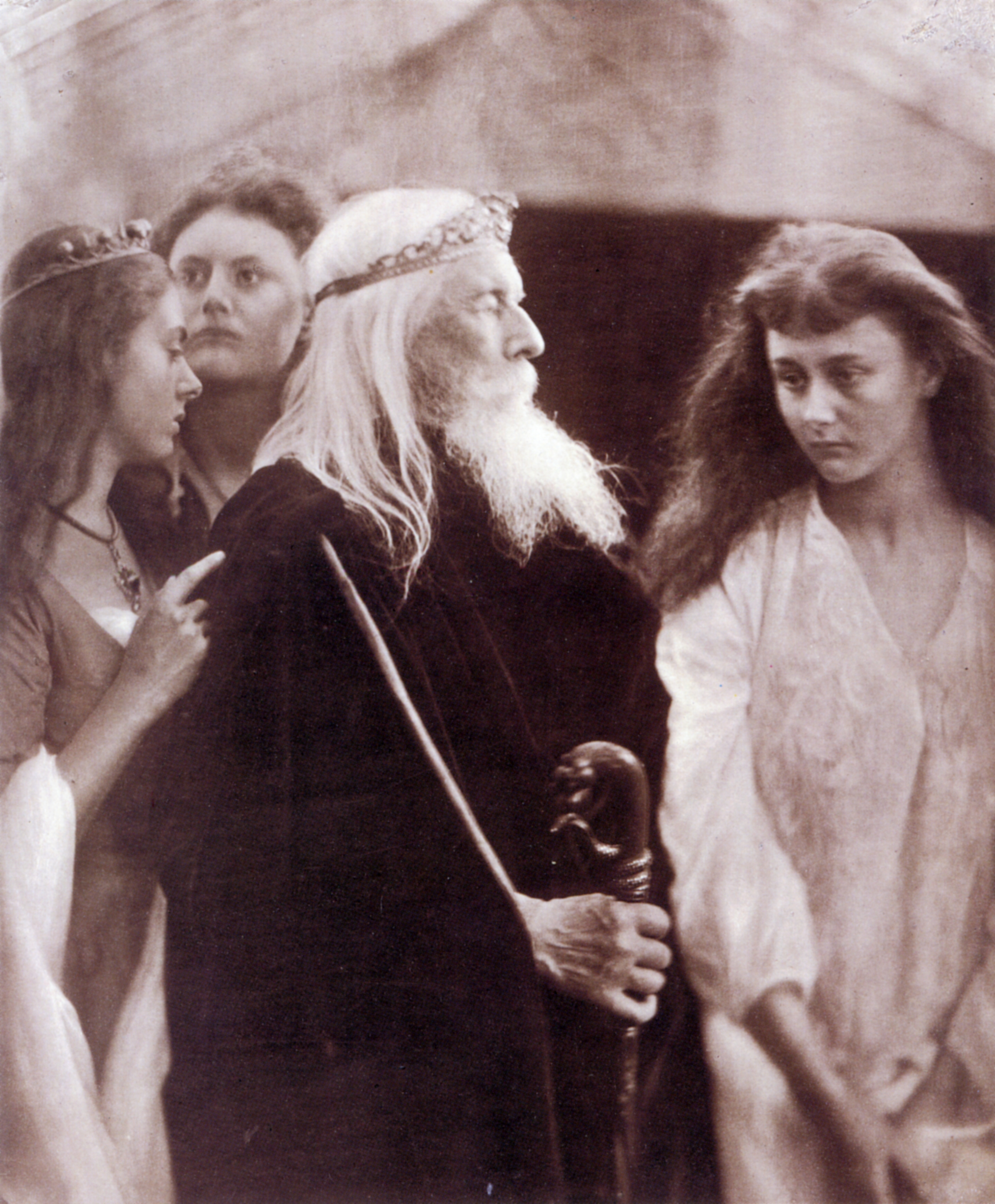 |
| King Lear allotting his kingdom to his daughters by Julia Margaret Cameron, 1872 |
I admit it. I haven’t read any Shakespeare since college, and that was (deep breath) nearly 20 years ago. I’ve read a good deal of The Bard in my time, but, somehow, King Lear escaped my attention. Book Phantom has remedied that. When I began the play, I confess, the language was challenging. I had to relearn how to read good Will. I found it helpful to read aloud, because Shakespeare just sounds so darn good. This exercise took me back to eleventh grade English in high school. My teacher, Ms. Thomason, god bless her, had great taste in literature. I give her full credit for instilling an appreciation of respectable reading. Anyway, whenever we read plays aloud in class, Ms. Thomason almost always chose me to read the lead female parts. That year I was Hedda Gabler, Medea, Antigone, and Lady Macbeth. Either I was the only kid in class who could halfway read aloud, or Ms. T was trying to keep me from chatting up my neighbor across the aisle. Nonetheless, I loved every minute of it, and this experience served me well when I read King Lear.
Of all Shakespeare’s plays I could have chosen, why did I choose Lear? Perhaps it’s because I am the youngest of three sisters, and I related to Cordelia. Also, it seems so many books and movies reference Lear (A Thousand Acres comes to mind), and I needed to know more. I was not disappointed – the word craft, the drama, the villains, the heroes, the tragedy – all timeless.
What I most admire about Shakespeare is that he wasn’t afraid to have kick-ass females in his plays (perhaps a nod to the feisty Queen Elizabeth?). Granted, they were usually villains, as were Lear’s elder daughters, Goneril and Regan. These sisters were treacherous and power-hungry. They manipulated their father with their affections, and he bequeathed his kingdom to them. With his land in their possession, they had no qualms about turning their backs on dear old dad, and they even plotted against him. At one point, Regan’s husband, the Duke of Cornwall, is killed by a servant loyal to Gloster and King Lear. Without hesitation, Regan takes up a sword and kills the servant in retaliation. Eventually, she gets her just desserts. When it appears the widowed Regan has secured the affections of the villainous Edmund, a man Goneril covets, Goneril poisons her sister. But Goneril is married and cannot have Edmund, so she turns a knife on herself.
King Lear is a tragedy, after all, so I don’t think I’m spoiling when I say the whole dang family winds up dead. The heroic characters – those unbendingly loyal to Lear – either die or suffer. There is some satisfaction in that the guilty are punished and the innocent vindicated in the end – but there is a mess of maimed and dead bodies left behind. Had the Earl of Gloster not been so ashamed of his bastard son, and had Lear’s circumstances not aroused Gloster’s suspicions against his own legitimate son, the Earl may have kept his eyes. Had Lear not been so vain – had he loved truth over flattery – all may have ended well. .
It is interesting that the negative perceptions of old age in Western Civilization were as alive in Shakespeare’s time as they are now. The play is a cautionary tale for aging parents. Baby Boomers take heed – Lear could be the icon of your generation. Never give over your power to your children. Hold onto your retirement savings (as opposed to blowing it all on grad school tuition, ridiculously extravagant weddings, and down-payments on starter homes). Never, never let your children back in the nest, and find a posh retirement community in which to spend your twilight years. As the wise and loyal fool said:
“The hedge-sparrow fed the cuckoo so long,
That it had its head bit off by its young.”
(Act I, Scene IV).

No comments:
Post a Comment